When it comes to the idea of innovation are you more likely to radiate Ted Lasso energy rather than Roy Kent? More Bandit than Bluey? Or put another way (that doesn’t rely on eclectic TV viewing habits): does the prospect of change make you feel more ‘Yeah!’ than ‘Meh!’?
The reason we ask is that we were inspired by paraplanner Zara Okoro’s recent thought-provoking article in Professional Paraplanner all about innovation. So we invited Zara from Abacus Associates, who’s also a PFS Paraplanner Panel member, to share her thoughts on how paraplanners can adapt rather than risk getting left behind.
Alongside Zara, we were joined by PSA Financial Services’ head of paraplanning, Ceetal Katechia, to join in the conversation. Ceetal has bags of practical experience in creating team environments in which new ideas flourish.
Together with host Richard Allum, this Assembly asked what innovation actually looks like, whether it’s always a good thing, what fuels it, and how can you influence it when you’re not the decision-maker?
It’s an Assembly that’s all about how you can embrace innovation and shape our profession rather than be subject to changes happening around you.
What can you expect when you listen?
You’ll come away with practical ideas to try out, whether you’re looking to improve your processes and workflow, make better use of existing tools and tech, or create space for bigger changes in your work.
Most of all, this is a chance to step back from day-to-day demands and take a few moments for yourself to think about how even small changes can shape your role and influence the direction of your career in paraplanning.
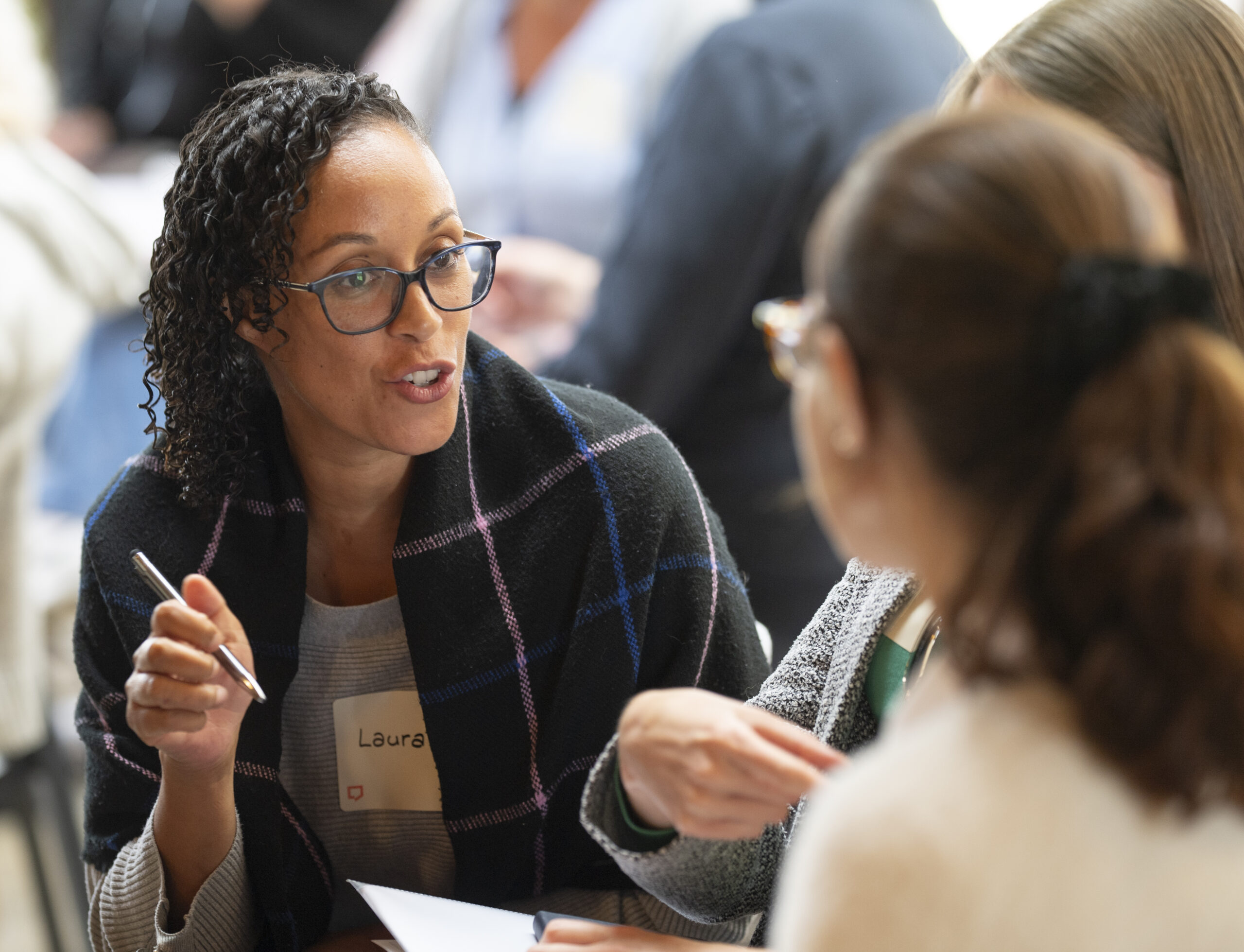
Thank you for joining us on 15 November to take your outsourcing game to the next level.
Thanks to the generous support of Assembly supporter, Aegon UK, we were able to team up with coach and consultant Rachael Hurdman to create a workshop where paraplanners could gather to exchange practical insights, knowledge and experience.
We hope you agree it turned out to be a day out of the office that made a real difference to you and your future in outsourcing.

Aegon UK’s Sarah Purves and Succession Wealth’s Ellie Welling return for a follow-up to last month’s ‘What kind of paraplanning leader will I be?’ Assembly.
Picking up where they left off in November, Sarah, Ellie and host, Richard Allum, explore a topic that every aspiring and existing leader will experience during their career: difficult conversations.
Sarah shares ideas and techniques that can help paraplanning leaders successfully prepare for and navigate discussions that you might otherwise dread.
During the second half of this episode, our guests focused on questions, ideas and topics raised by paraplanners during the first Assembly.
But whether or not you joined Sarah and Ellie last time, and haven’t had a chance to listen or watch it on catch up yet, you’re sure to gain plenty to inform your reflections on successful leadership by tuning into this discussion.
Watch or listen now
So if you’re on the lookout for an hour that’s packed with practical ideas and insights that could prove vital to your next steps in paraplanning, look no further.

Perhaps you’ve been thinking about stepping into a leadership role in paraplanning. Or you’re already managing others and want to build your skills. Either way, our specially extended lunchtime Assembly at 12.30pm on Wednesday 13 November is for you.
What’s in it for me?
Over 90 minutes, you’ll explore what kind of paraplanning leader you could be and discover how you can make that step with confidence – all from the comfort of your own desk (or canteen, cafe, or kitchen table).
Wherever you’re joining from, we’ll have Aegon UK’s learning and organisational consultant, Sarah Purves, on hand to help. Throughout the Assembly, Sarah will be inviting you to try out a series of exercises that will help you:
- Identify the paraplanning leadership qualities you already have (you might be surprised)
- Discover your natural management style by learning from what’s worked (and what hasn’t) with your own managers
- Get better at those tricky conversations that come with leading others
- Build a practical toolkit you can use straight away to have more impact in your role
What’s more, Sarah will be joined by paraplanner Ellie Welling from Succession Wealth who will be sharing her own experience of moving into a leadership role – what she’s learned, what she wishes she’d known, and how she’s gone about developing her own approach to managing a team.
It’s an Assembly that’s specially designed so you can:
- share your thoughts about the challenges of leadership without judgment if you’d like to
- learn from the experience of others at different stages of their career
- gain practical tips you can actually use right away
- work out if leadership is right for you and what it could look like
- ask questions you’ve always wanted to ask about managing others
Save your spot now
There’s no magic formula for becoming a leader. But there are tools and techniques that really work. Whether you just want to tune in to listen and learn, or get stuck in and share your thoughts in the Chat, you’ll be really welcome.
So how about it? Save your spot now.
Don’t miss part two!
This Assembly was the first of a two-parter on paraplanning leadership. In the second part, Sarah, Ellie and Richard will dig into dealing with difficult conversations as well as exploring the questions raised in the Chat at today’s Assembly.
To save your spot for that Assembly, visit the event page.

Are you ready to take your outsourcing game to the next level? Then join us from 10:30am on Friday 15 November 2024 for a day that’s tailor-made to inspire you to achieve your personal and professional ambitions in the world of outsourcing.
Thanks to the generous support of Assembly supporter, Aegon UK, we’ve been able to team up with coach and consultant Rachael Hurdman to create a workshop where paraplanners can gather to exchange practical insights, knowledge and experience. So whether you’re already running an outsourced business, working for one, or just thinking about it, this is your chance to:
- Get a fresh take on the outsourcing landscape
- Swap ideas with other paraplanners who really get what you do
- Leave with a solid plan you can put into action straight away
Plus, you’ll bag 5 hours of CPD.
Hosted at Aegon UK’s offices on the 26th floor of the landmark Leadenhall Building in the City of London, even the awesome views will do their bit to spark your big ideas.
It promises to be a day out of the office that could make a real difference to you and your future in outsourcing. Why not join us?


Why should you come?
The day’s content has been designed exclusively as a result of research conducted with outsourced paraplanners – plus insights gained from our regular informal outsourced Assemblies. That means we know we’ll be tackling the topics that are front-of-mind for practitioners leading or working for outsourced paraplanning businesses. It’s a tailor-made opportunity to gather with paraplanning peers where you can listen, learn and share experiences about things that really matter.
The morning sessions
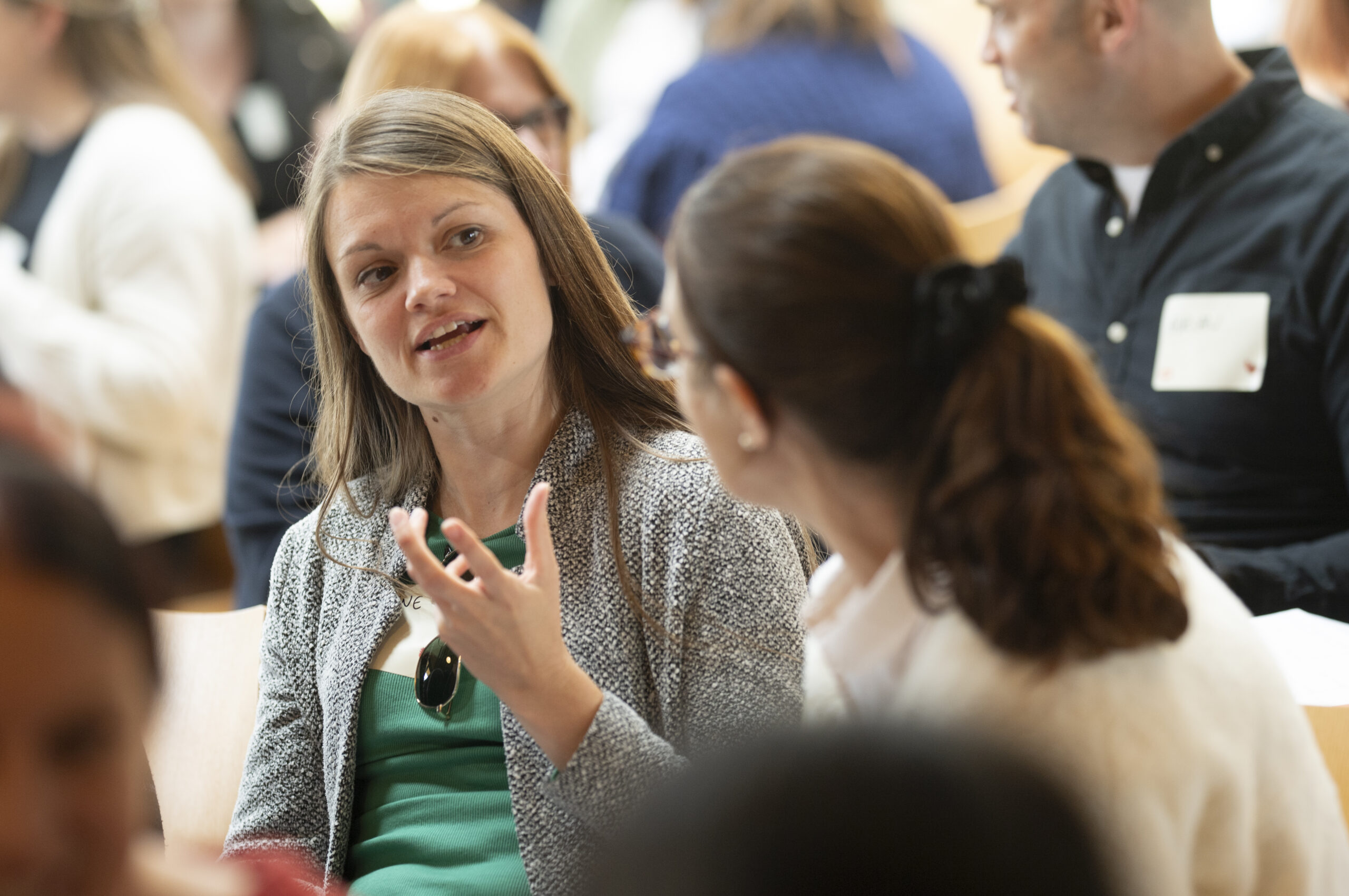
Session 1: How to navigate the ups and downs of business
In this interactive session Rachael will help you to focus on how to successfully navigate and succeed through the inevitable opportunities and challenges that are part and parcel of being in business.
Get stuck in with this hands-on session that will tackle the roller-coaster of business ups and downs head-on. Pick up practical tools to build your resilience and keep your mind sharp – stuff that’s really useful for you and your team. Learn how to stay on top of things when life feels a bit uncertain. By swapping stories and experiences with other participants, you’ll walk away from this session with simple, effective ideas to help you flourish at work.
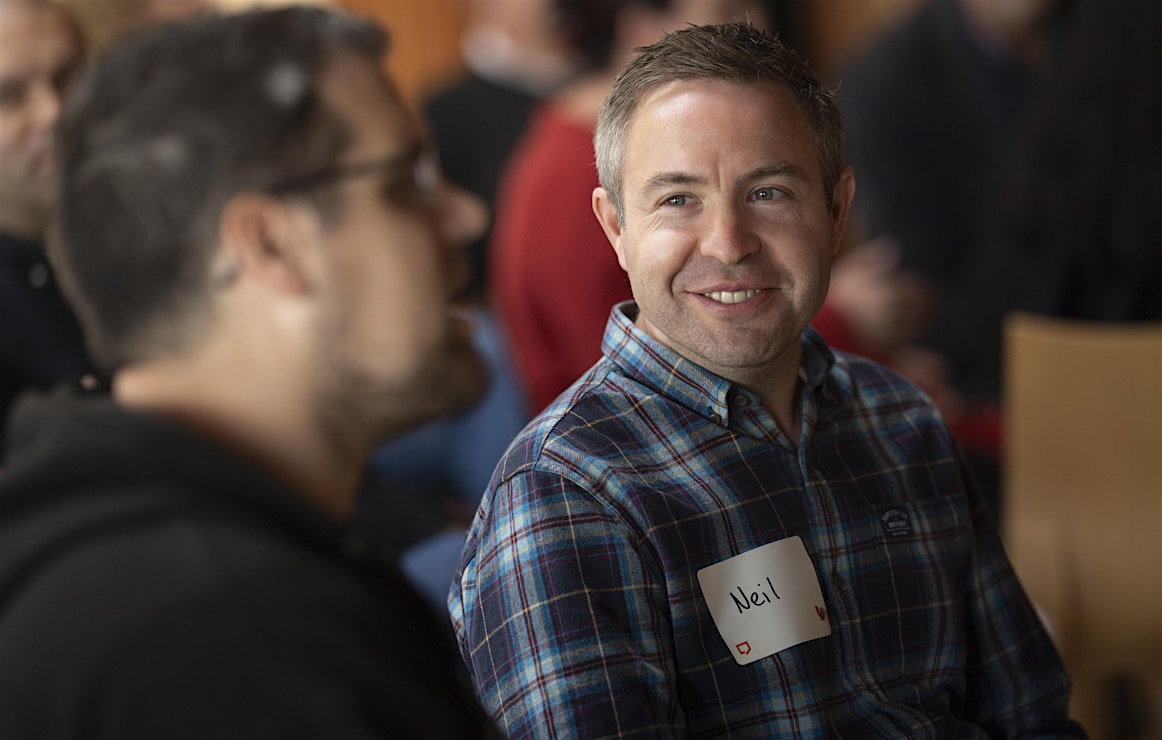
Session 2: Make every work relationship count
Our second session in the morning is all about getting more from your work relationships – including those vital ones with clients. Designed especially for this Assembly event by Rachael, this session will help you to:
- Spot the connections that really matter – and make them even better
- Use Rachael’s tried-and-tested ‘contracting’ template to build stronger partnerships
- Set boundaries that really work for you and the people you work with
- Develop a flexible approach to being assertive when you need to be
It’s an Assembly, so roll up your sleeves for this interactive session where you’ll work in groups to try out your new skills right away.
The afternoon sessions: Group discussions
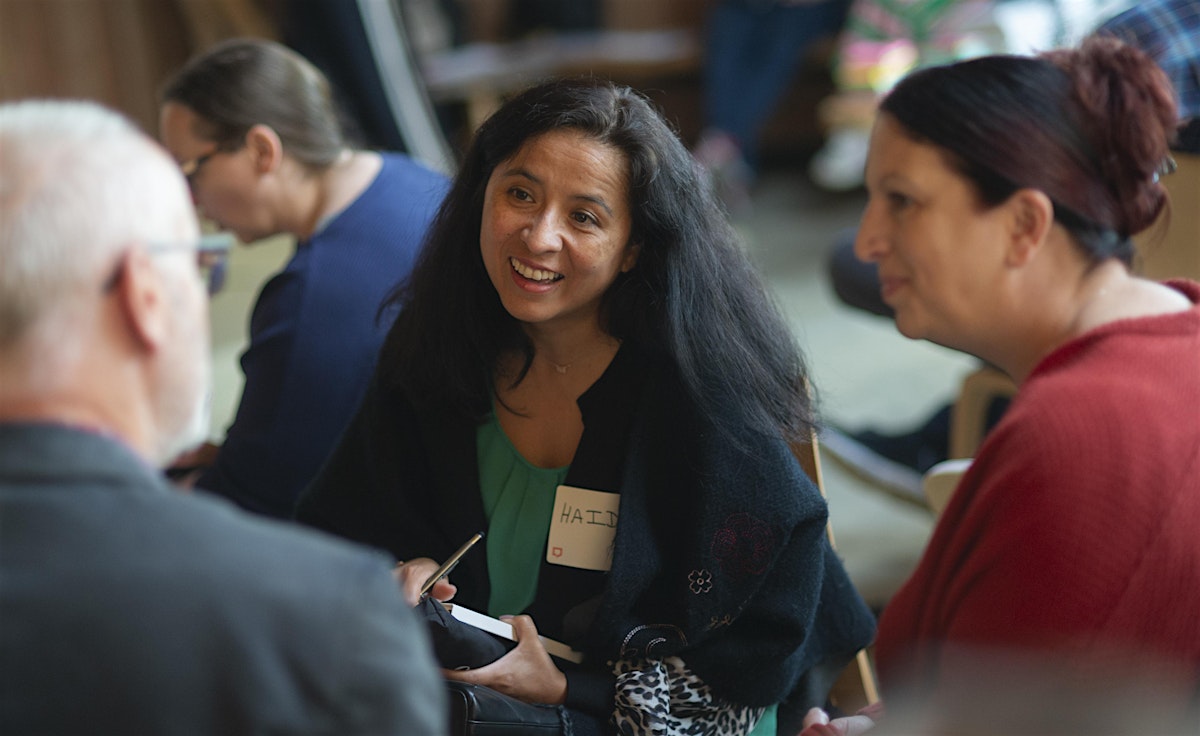
Sam Davies (In Step Paraplanning) and Richard Allum (The Paraplanners) will be joined by Rachael to help facilitate an afternoon of three x 40-minute group-based discussions in true Assembly style. The first two topics have bubbled up consistently during informal outsourced paraplanner gatherings. They are:
Efficiency boost: What can you do to squeeze that extra bit of time and attention from your practice’s workflow? What ideas, tools and techniques have worked for other outsourced businesses that might also work for you? And what wisdom can you share that might prevent a paraplanning peer from repeating a mistake you made? This session is all about efficiency: how to achieve it, how to sustain it and how to keep things fresh.
Smart growth: What does your business’s future look like? Do you want more clients? Level up the services you offer? Or something else entirely? Even if it’s all three, getting your bearings in business is an essential step before deciding on a destination and plan. This session will allow you to test your ambitions and thinking by exchanging ideas and experiences with paraplanners just like you – and those who have seen it, done it, and continue to learn from it.
The third topic? As a group, you’ll decide the third and final topic on the day, which means you already know that it’ll be a topic that really matters right now.
The wrap up
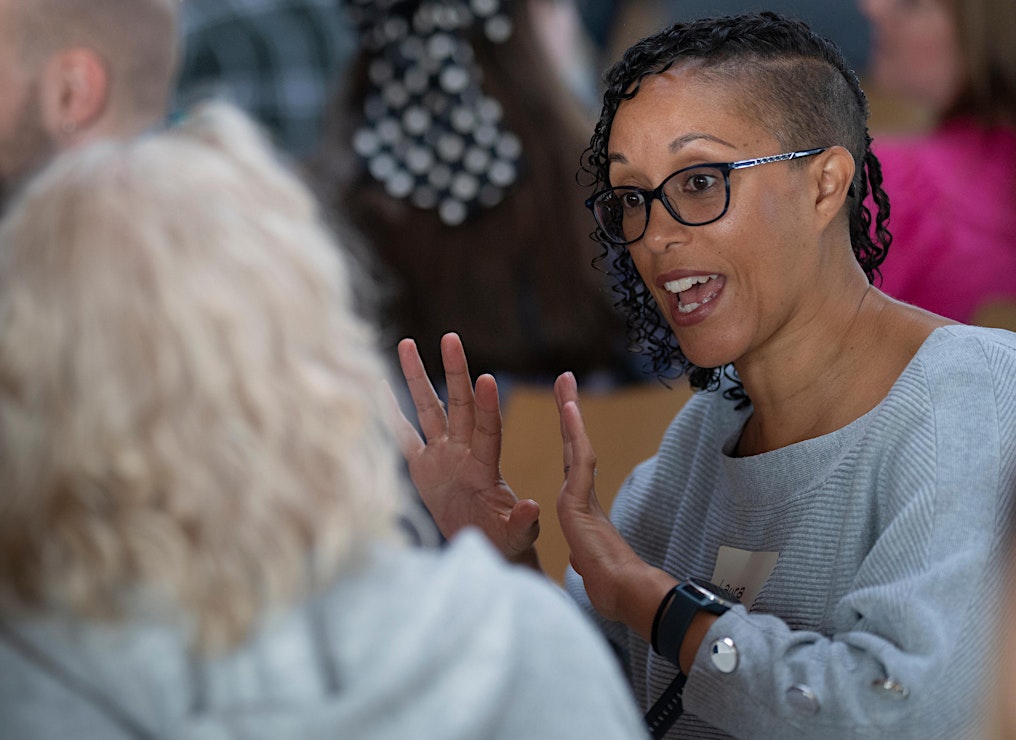
As we wrap up, Rachael will guide you through a collaborative session to consolidate your insights. You’ll have the chance to pinpoint your key takeaways and consider how to apply them in your day-to-day work.
There’ll be time to bounce ideas off your peers and ask those burning questions. Our goal? To send you back to the office feeling energised, well-informed, and equipped with practical knowledge you can use right away.
The wind down
If you have time before heading home, we’ll find a suitable venue to gather for a bit of post-workshop conversation. Perhaps even somewhere in the historic Leadenhall Market right next door!

Your Commitment Log

During the day we will share a simple and effective Commitment Log with you to encourage you to capture your key learns and take-aways from each of the sessions throughout the day. If you took part in September’s Big Day Out, the Commitment Log is the ideal tool to inform your development plans. If you didn’t take part in The Big Day Out this year, we will have copies of the development plans for you too.
The running order
| 10:30 | Hello |
| 10:40 | Session 1: How to navigate the ups and downs of business |
| 11:40 | Break |
| 11:50 | Session 2: Make every work relationship count |
| 12:50 | Lunch |
| 13:50 | Topic No 1: Efficiency boost |
| 14:30 | Topic No 2: Smart growth |
| 15:10 | Break |
| 15:30 | Topic No 3: To be decided on the day! |
| 16:10 | Wrap up |
| 16:40 | Wind down |
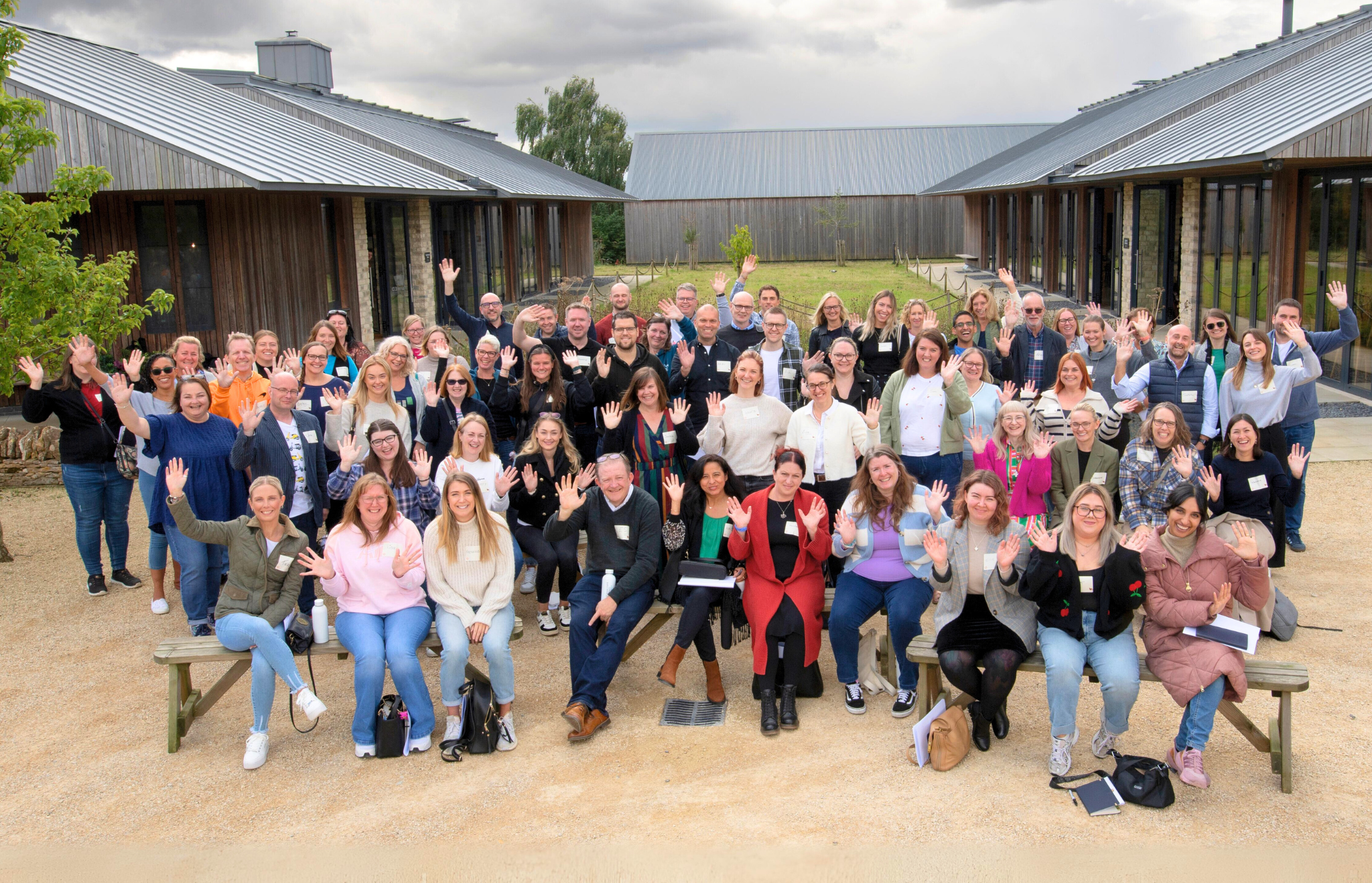
Paraplanners from all over the country gathered for the Paraplanners’ Assembly’s Big Day Out 2024 on 12 September 2024.
From its first meeting in 2013, the Paraplanners’ Assembly’s annual gathering has created space for sparking collaboration and conversation among paraplanners that is unlike any other event in the world of wealth management.
Why?
The Big Day Out is an informal gathering that offers six hours’ worth of CPD thanks to its combination of tailor-made interactive sessions led by hand-picked experts (and designed especially for the event), and group discussions facilitated by paraplanner hosts.
It makes for a supportive and encouraging space in which you can listen and learn, and share ideas, knowledge and insights. And it’s a unique environment in which you can really focus and flourish – both professionally and personally.
You’ll feel you belong at The Big Day Out because The Big Day Out belongs to you. Here’s what happened at The Big Day Out 2024.
Welcome!
Assembled paraplanners joined us in the conference barn for a welcome from Big Day Out hosts, Sam Tonks and Chris Wormwell.
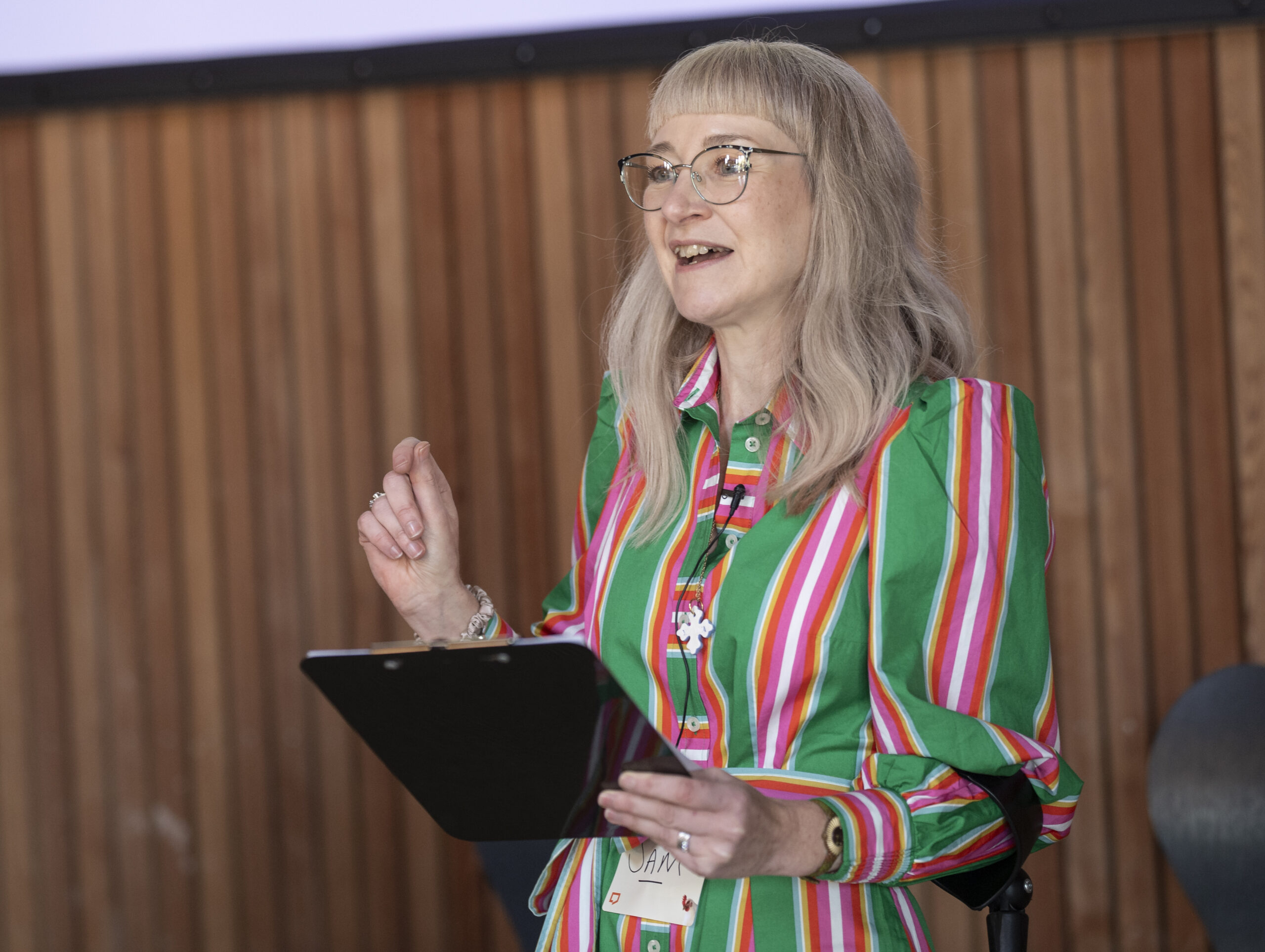
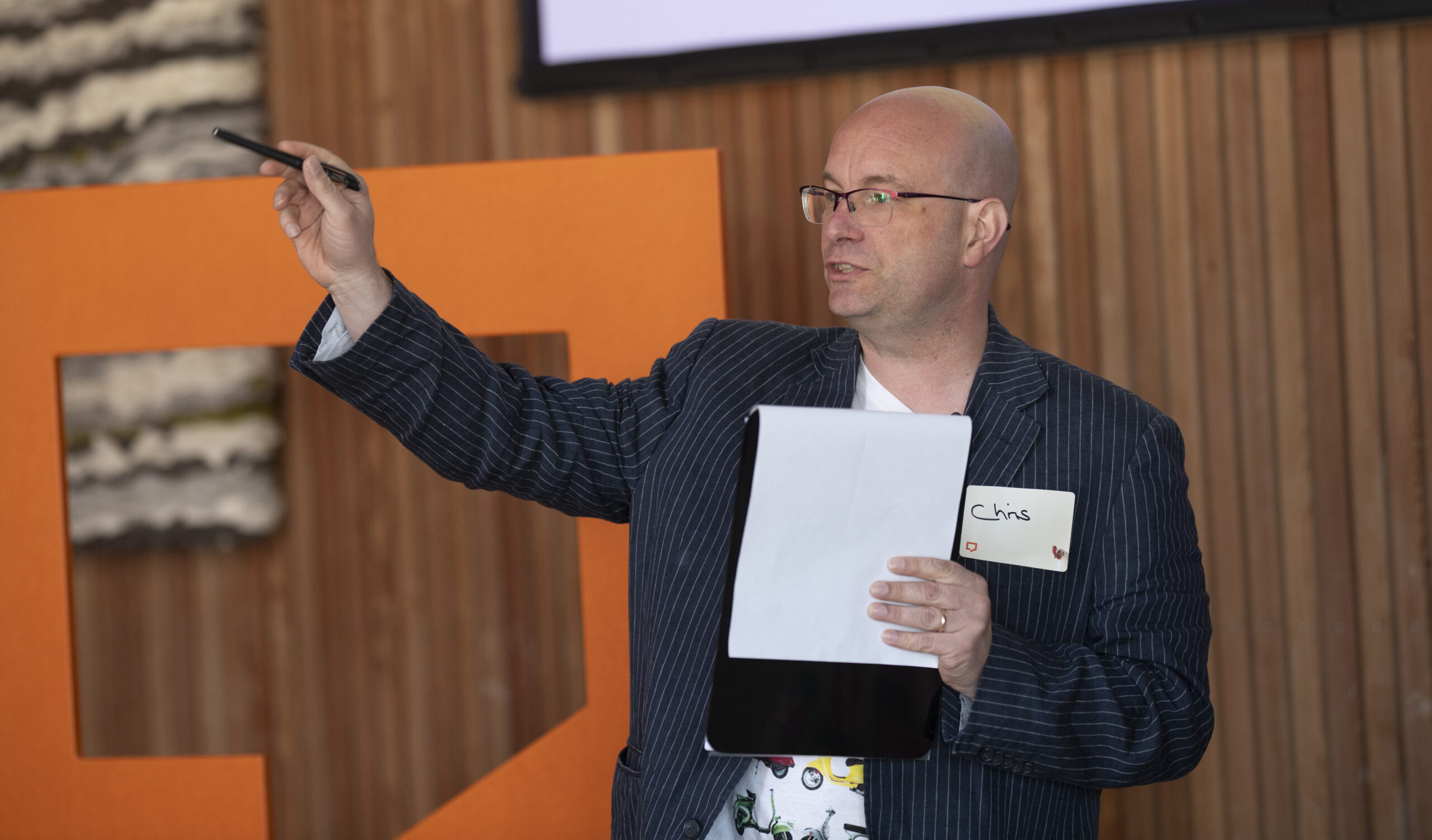
Then we got straight into…
Hone it. Own it: One hour to perfect your development plan
New for this year, and designed especially for the Paraplanners’ Assembly, we open and closed the day with two really interactive sessions led by Arch Inspire’s Rachael Hurdman.
What were they all about? How to create an actionable and practical plan to achieve your personal and professional development goals.
But this wasn’t some dry run-of-the-mill classroom-type session because IT WAS A BIG DAY OUT! So Rachael shared practical tools, techniques and insights that (1) participants could try out throughout the sessions at your Big Day Out and (2) will last participants (and people back at the office they shared them with) for years.
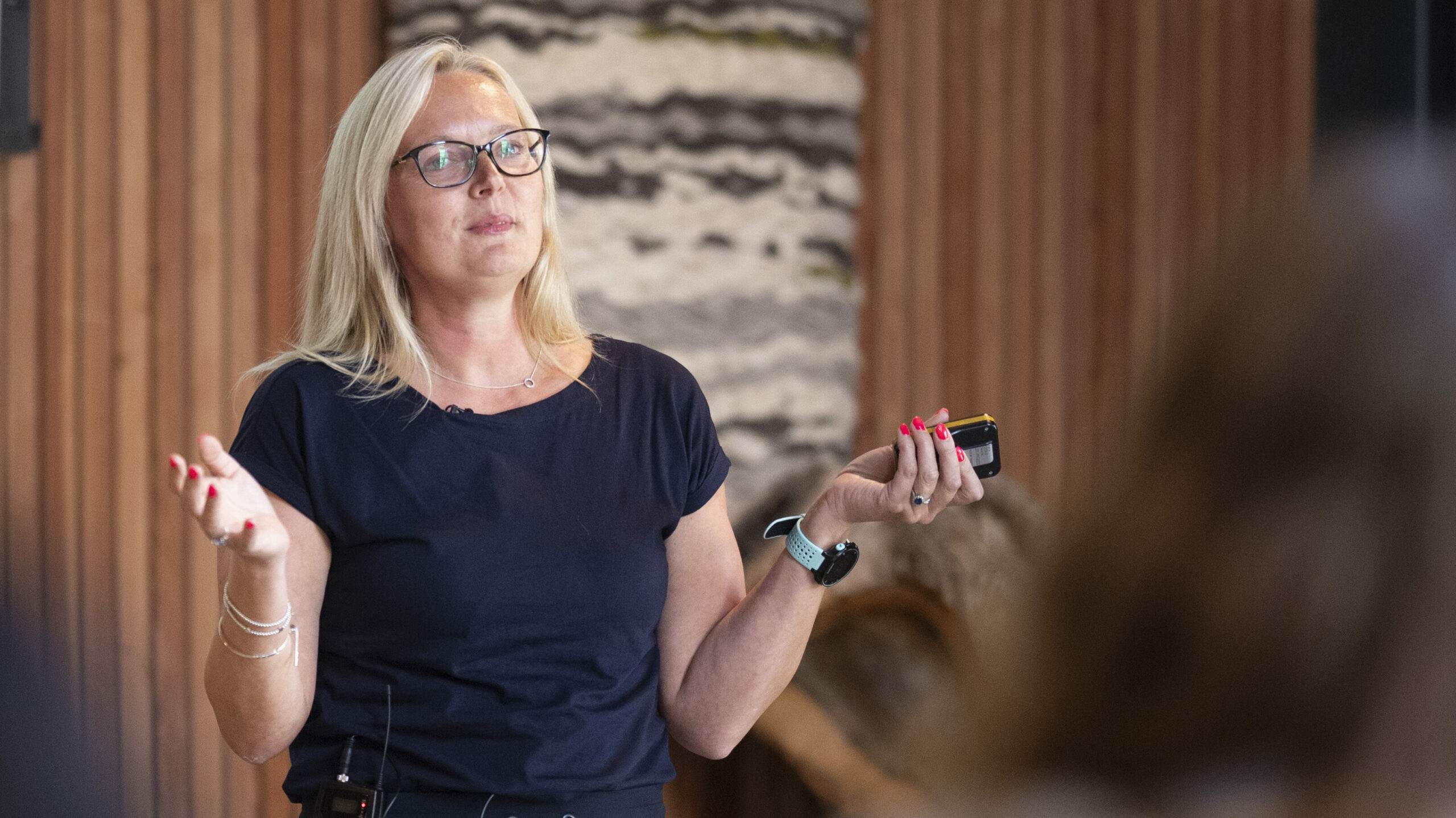

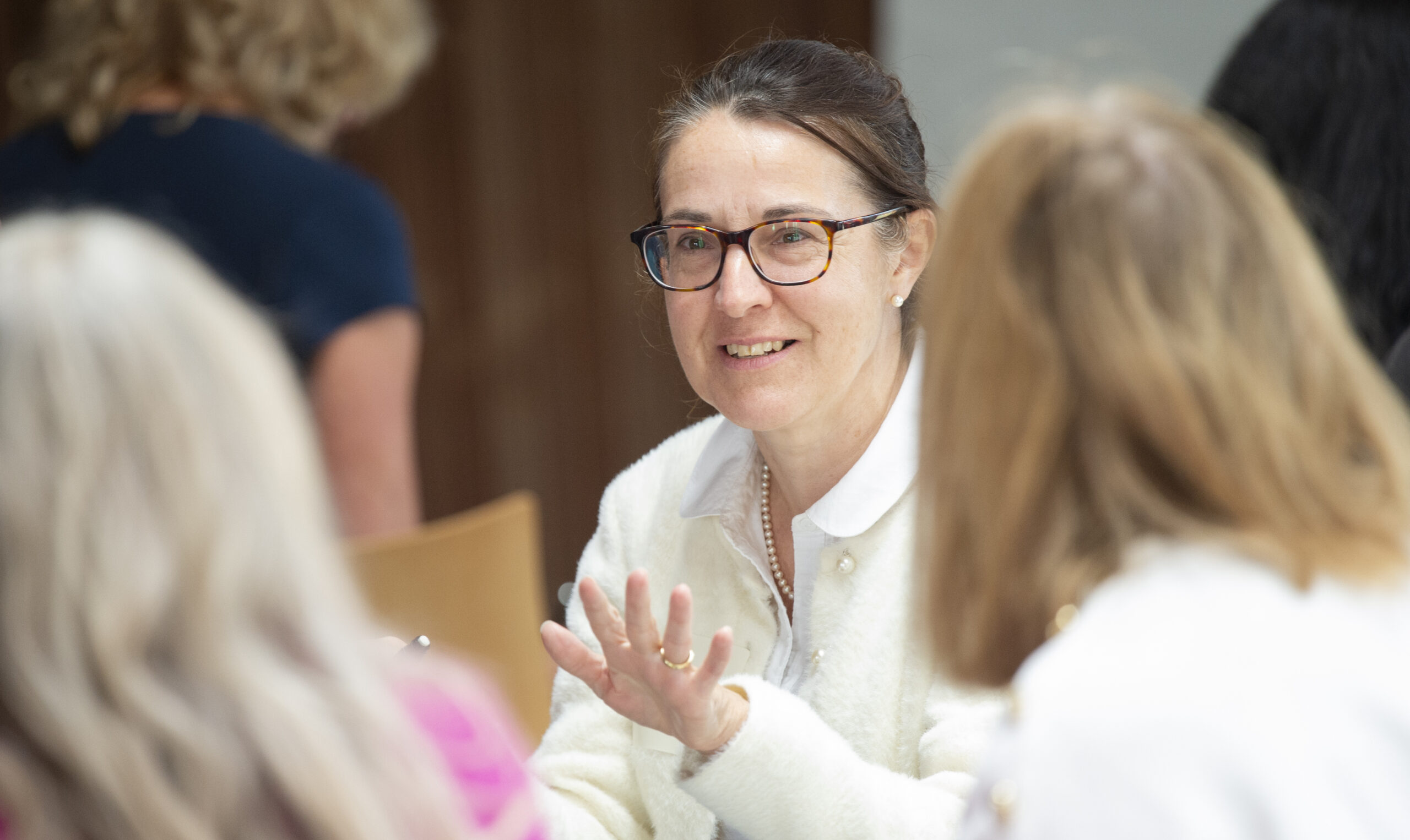
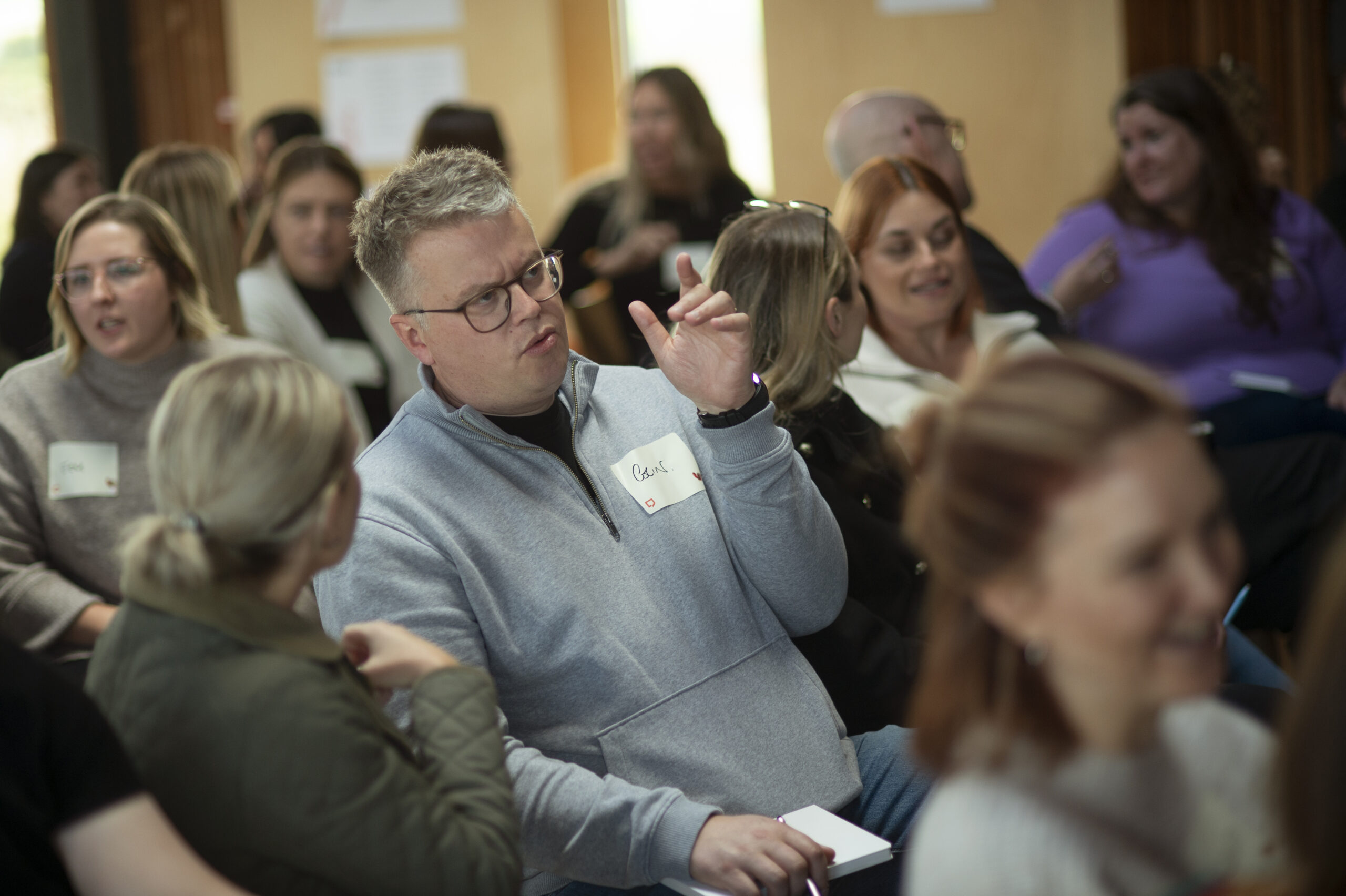
Crop Rotations
Following the opening session, the Assembly split into three groups (called Crop Rotations) to tackle three topics over three 45-minute sessions.
ROTATION A
Quiz the experts
Our technical sessions are a perennial favourite among paraplanners.
After all, it could be the one chance you get this year to fire any question you can possibly think of at experts who – we’re pretty certain – will be able to answer them. (As long as it’s a technical paraplanning question and not e.g. ‘Yes, but what’s the universe expanding into?’)
This year is no exception. Your stellar quartet of experts includes:
– Les Cameron of M&G Wealth
– Gareth Davies of Scottish Widows
– Natalie Howard of Canaccord Genuity
– Brian Radbone of Transact
So begin collecting your questions today and you’ll be all set to quiz the experts on the day.
ROTATION B
Productivity tips you live by. Apps and tools you can’t live without.
Because the Big Day Out attracts paraplanners from companies large and small, and from in-house and outsourced teams, we know that the ability to influence things such as report content and formats, and choice of software and tech tools varies widely among participants.
But one thing that won’t vary widely is the way we go about getting our own stuff done.
So that’s what this session is all about: what’s the secret to your day-to-day personal productivity? What are the tips or techniques that help you get things done? And what tools, apps or websites do you keep coming back to?
Whether you’re the world’s leading expert on the application of the Pomodoro method, Eisenhower matrix and tried all the task management apps – or are thinking ‘Pomodoro what?’, this will be a fantastic chance to discover how and why other paraplanners do what they do, the way they do.
ROTATION C
You, clients and the future of advice technology.
You already know how influential technology is in day-to-day paraplanning. But what does the future of work look like for paraplanners with the arrival of AI? In this crop rotation – designed especially for the Big Day Out – NextWealth founder and managing director, Heather Hopkins, will lead a conversation that’s all about how technology is changing advice, what innovations are coming down the line, and how they’re likely to influence the practice of paraplanning.
This is a fantastic opportunity for you and your paraplanning peers to share what you think and feel about the future – and technology’s role in it.
From due diligence to data, and research to report writing, this is a unique chance to explore how emerging technologies will influence paraplanning facilitated by one of the most influential figures in UK advicetech today
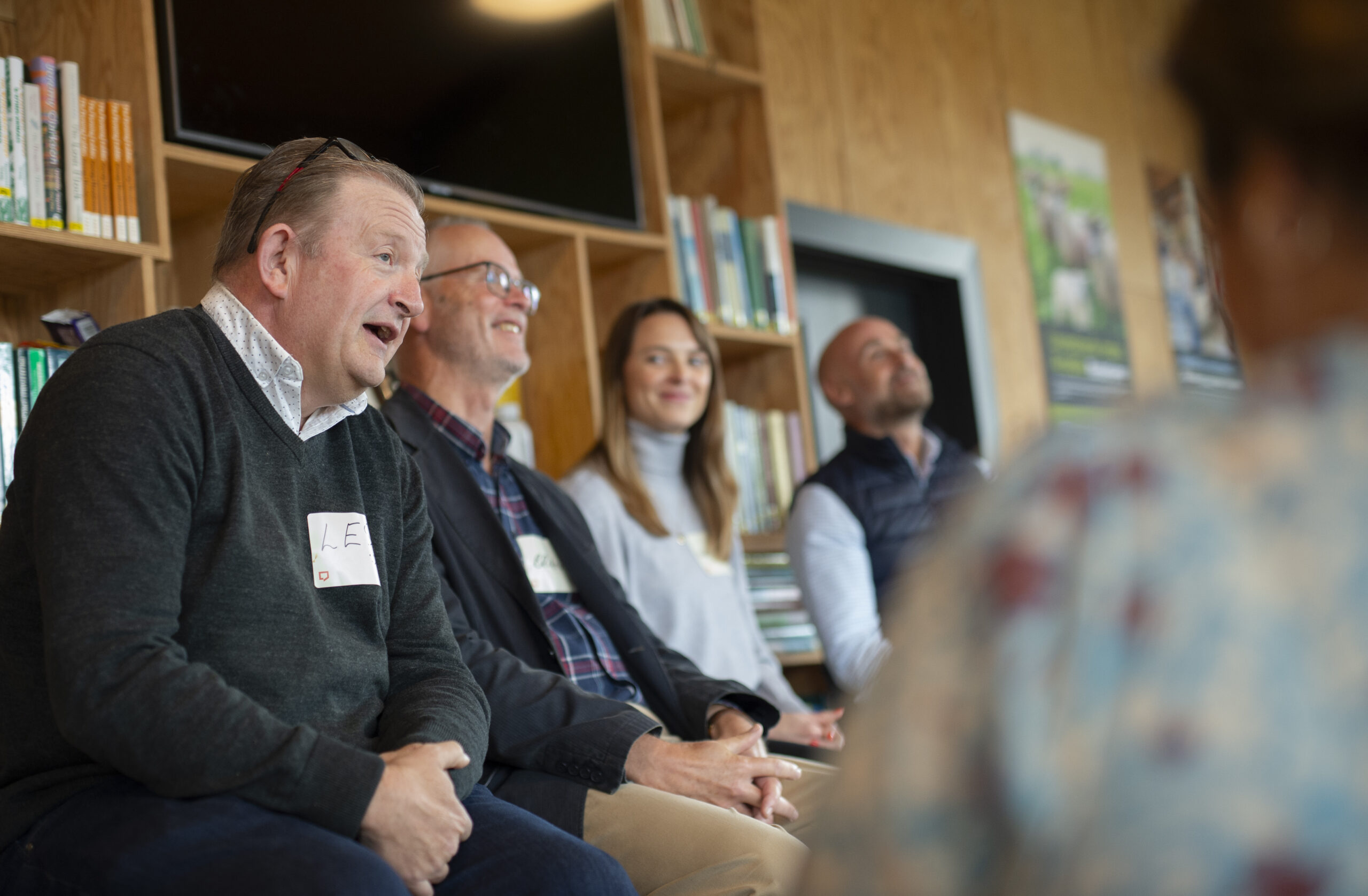
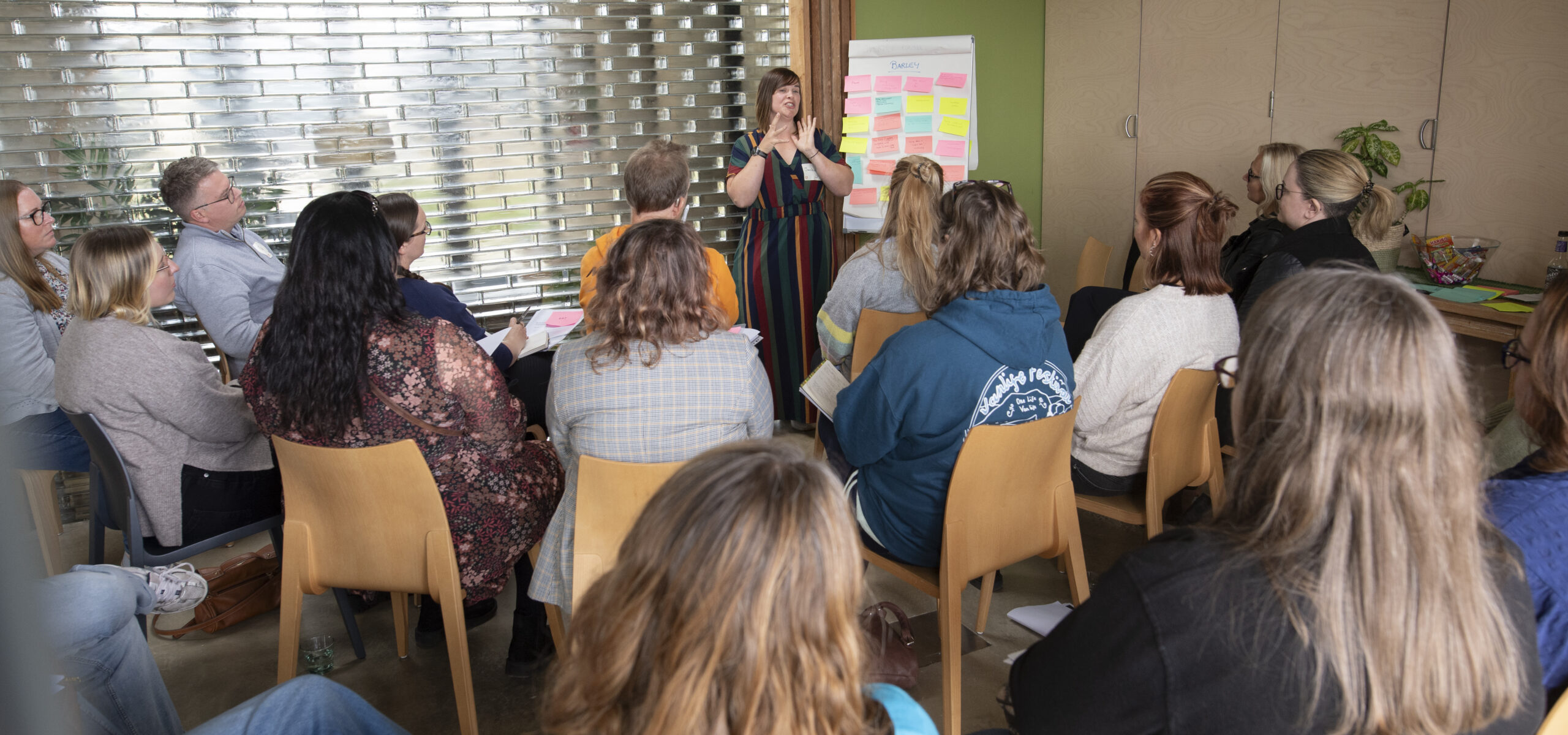
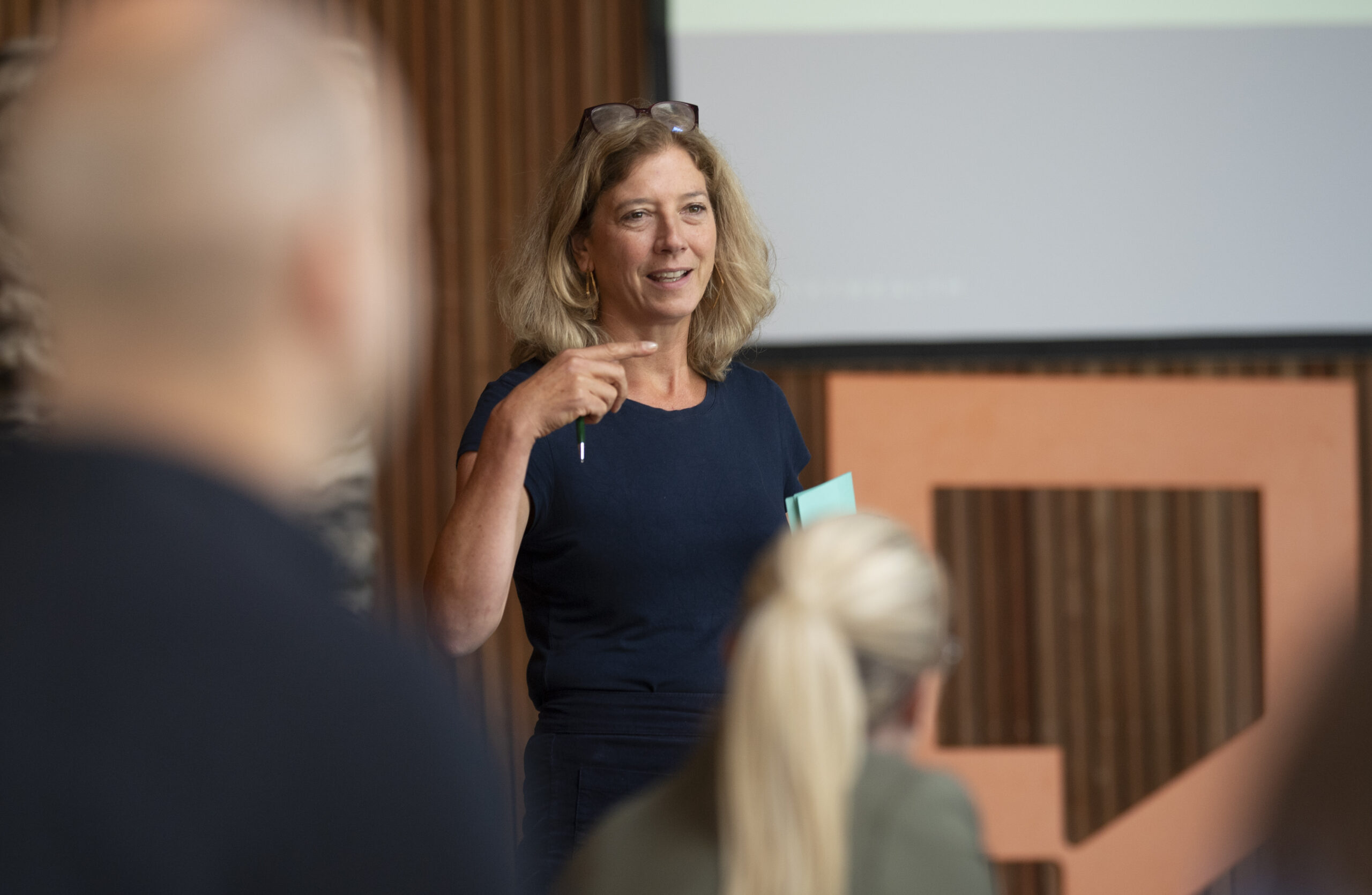
Lunch
Locally sourced and freshly prepared, we tucked into pulled pork or vegetarian chilli (or both!) along with loads of healthy salads and slaws that were grown on the farm.

Hone it. Own it: Part Two
Rachael Hurdman returned and, in this closing session, invited participants to take a couple of practical steps that will enable you to gather the loose ends of your personal action plan. It was another really interactive session where you could try out your new tools, and round off your development plan – and Big Day Out – perfectly.
And finally…
The Paraplanners’ Assembly
It was time for the session after which the Assembly is named. Just like at our first gathering in 2013, Sam and Chris will opened up the floor for you to share anything that’s on your mind.

If you’re a paraplanner who lives or works in striking distance of central London, then The Other London Assembly from 10am on Friday 20 October 2023 will be right up your street.
Hosted by Dan Atkinson and Andy Schleider, this is your chance to gather with paraplanners from your neck of the woods to learn what’s going on in each other’s worlds, share ideas, and discover practical tips and illuminating insights.
Book your spot and you’ll be able to shape the agenda for the two-hour get-together but – right now – we expect paraplanners taking part to exchange ideas on report writing and, now that the consumer duty is a feature of daily life, explore how we’re demonstrating ‘fair value’ in annual reviews.
Plus, the chance to tackle any other paraplanning topic that’s on your mind when we gather at the London Wall Place office of Barnett Waddingham.
From our very first meeting in 2013, the Paraplanners’ Assembly has created gatherings – in person and online and all over the UK – that spark collaboration and conversation.
Expect the same from The Other London Assembly.
After all, Assemblies only happen because paraplanners show up. You’ll feel you belong at The Other London Assembly because The Other London Assembly belongs to you.
So how about it? Book your spot now.
There are times when we’re recording an online Assembly or bitesize video or dedicated podcast episode and we just think OMG EVERYONE IS GOING TO ABSOLUTELY LOVE THIS.
And that’s the case with this interview with consultant and founding director of About Consulting Group, Jon Dunckley.
Because this podcast is all about neurodiversity.
(Its origins lie in this comment by Planner12 posted at The Big Tent last year.)
And, as Jon (who is autistic) says very early on in the episode, neurodiversity matters to me, you and everyone.
After all, we each have a way of thinking that’s unique to us. We all occupy our place in a neurodiverse world.
But if the way we think is plotted on a spectrum, most of us would be considered ‘neurotypical’.
Yet plenty of us – at least 1 in 10 in the UK – function, learn and process information differently from the neurotypical.
Neurodifference and work
We may be neurodifferent but, despite thinking differently, we’re expected to adapt and succeed in a world that’s geared towards neurotypical people.
And that’s why we thought Planner12’s question – and the thread that their comment sparked – was such a great starting point to consider neurodiversity and its consequences personally and professionally whether we’re neurodivergent or neurotypical.
Because even if we’re not neurodifferent ourselves, people we work with will be. Either way, what do we need to consider about day-to-day working life so we each get the chance to thrive, contribute and gain fulfilment from work?
What do we mean by neurodifferent? What conditions are considered neurodifferent? If you’re neurodifferent, do you mention it to your employer? Do you need a diagnosis? What’s your approach to studying and sitting exams? How should you adapt your leadership style for a range of neurodifferent conditions? And how does your condition influence the way you manage your team?
Invaluable insights and practical tips
In just under an hour, host Richard Allum and Jon explore just about everything you could possibly want to cover.
Expect talk of autism, ADHD, dyspraxia, dyscalculia, dyslexia and dysgraphia. Learn about TIC syndrome, the ‘Pygmalion effect’, why people with ‘spiky profiles’ are good for business. Plus why job adverts should (a) encourage applicants with spiky profiles and (b) be really clear about what a job will actually involve.
And there’s so much more.
In fact, this is an area we’re going to explore more – and not leave it too long before we do. So if you think of anything that the Assembly could explore once you’ve listened please get in touch and tell us what you think.
Now, tuck in to this latest episode. We think you’re going to love it.
Listen to the Assembly
A few of links mentioned by Jon during the episode
British Dyslexia Association: Dyslexia-friendly style guide
The Neurodiverse Workplace by Victoria Honeybourne
Think Human Business Writing course
BTS podcast: Neurodiversity and studying for regulated exams
PFS Power: Working with vulnerable clients
Cornell note-taking system (YouTube video)
Online Assembly: Design principles for reports
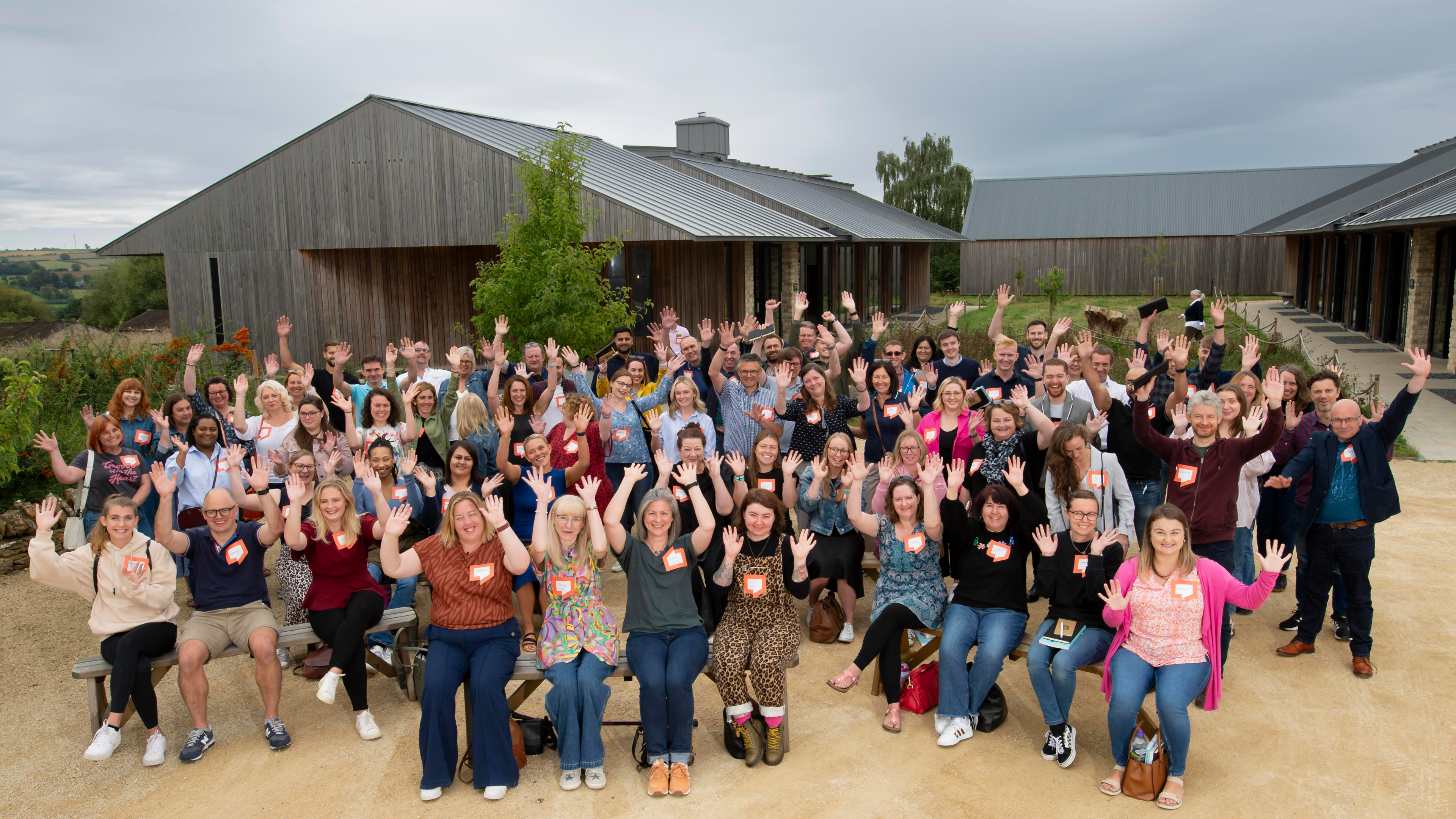
Paraplanners from all over the country gathered for The Big Day Out 2023 on 14th September 2023.
For the second successive year, our destination was the fantastic FarmED – right in the heart of the Cotswold countryside.
(Trust us, it’s lovely.)
This year, The Big Day Out was split into two halves:
1st half: All about paraplanning today
2nd half: All about paraplanning tomorrow

Three groups
Following The Big Welcome, we split the Assembly into three groups – Barley, Oats, and Wheat.
Each group had paraplanning hosts. Hosts volunteered to make sure you were where you needed to be when you needed to be there and to help facilitate conversations.
(The Big Day Out wouldn’t have been possible without our volunteers, so please gave a big hand 👏 to this year’s hosts: Kez Condy, Becky Jones, Jackie Manning, Sian Davies Cole, Pippa Oldfield, Jo Parkes, and Colin Stewart.)
First half: Paraplanning today – Crop Rotations
Each group spent 45 minutes in each of the following three sessions.
Technical top tips
Expert: Les Cameron, Head of Technical, M&G Wealth
This was a chance to quiz a popular Assembly regular in person with those burning technical questions that you’ve always wanted someone to answer.
Suitability reports: a fair value assessment
Leader: Caroline Stuart, Founder of Sparrow Paraplanning
Caroline invited groups to consider whether suitability reports were still fit for purpose and they’ve for a Consumer Duty world.
Were our planning assumptions still fit for purpose?
Leader: Dan Atkinson, Head of Technical, Paradigm Norton
Is it time to re-assess your planning assumptions? Could you really rely on what had happened in the past to plan for the future? This was a chance for participants to test the assumptions that apply to the ‘planning’ part of a paraplanners job title. To help, we were joined by three experts: Thomas Hogg of Timeline, Parmenion’s Jasper Thornton-Boelman and Jon Palin from Barnett Waddingham.
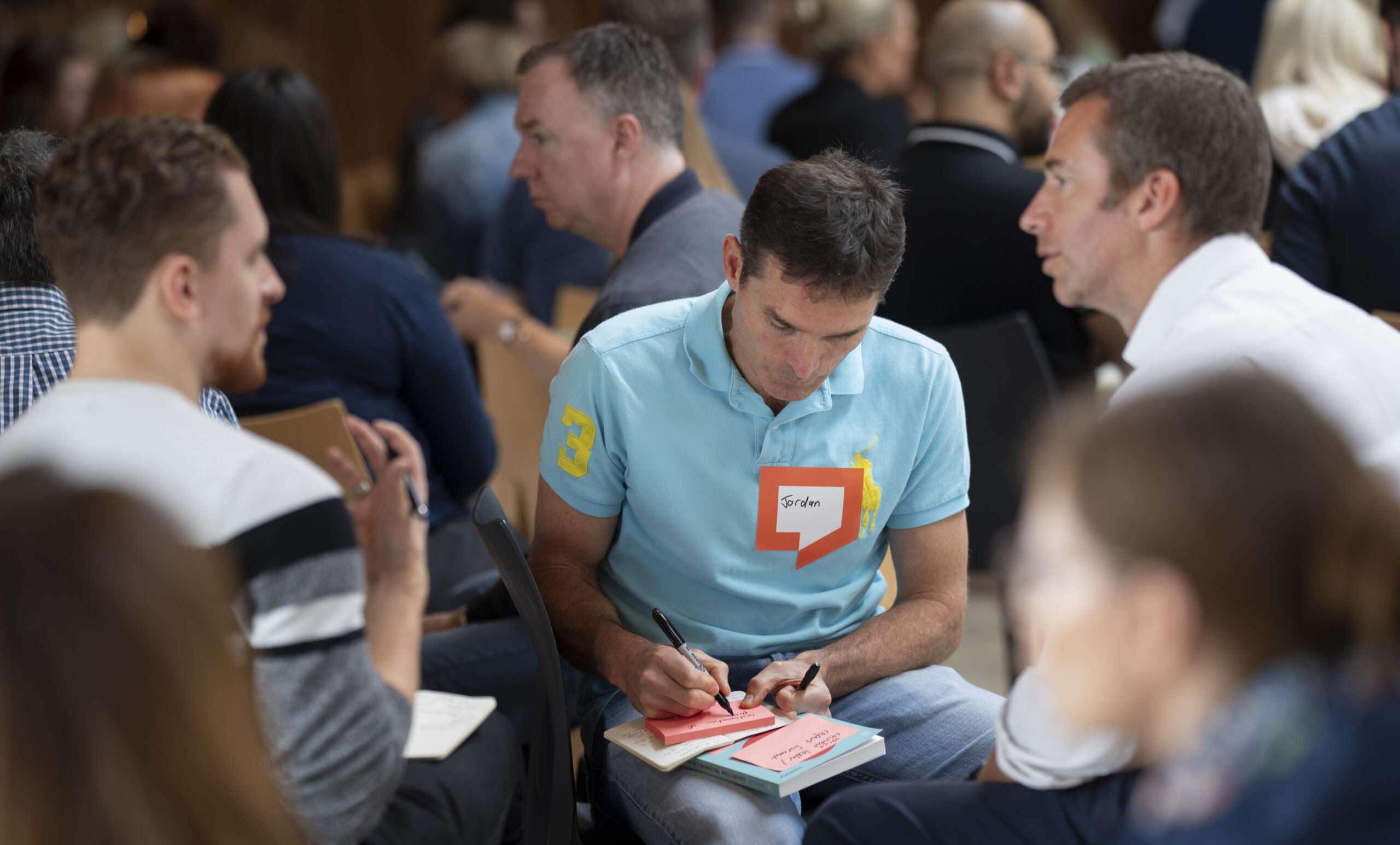
Lunchtime drop-in: Outsourced Paraplanners Banter + Chat x Paraplanners’ Assembly
Lunchtime drop-in: Outsourced Paraplanners Banter + Chat x Paraplanners’ Assembly
Christina Georgiou and Andy Schleider hosted a drop in for participants who are starting out as an outsourced paraplanner, thinking about it, or already are. The session was an IRL version of the ‘Outsourced Paraplanners banter + chat group’ hosted by Andy on WhatsApp.
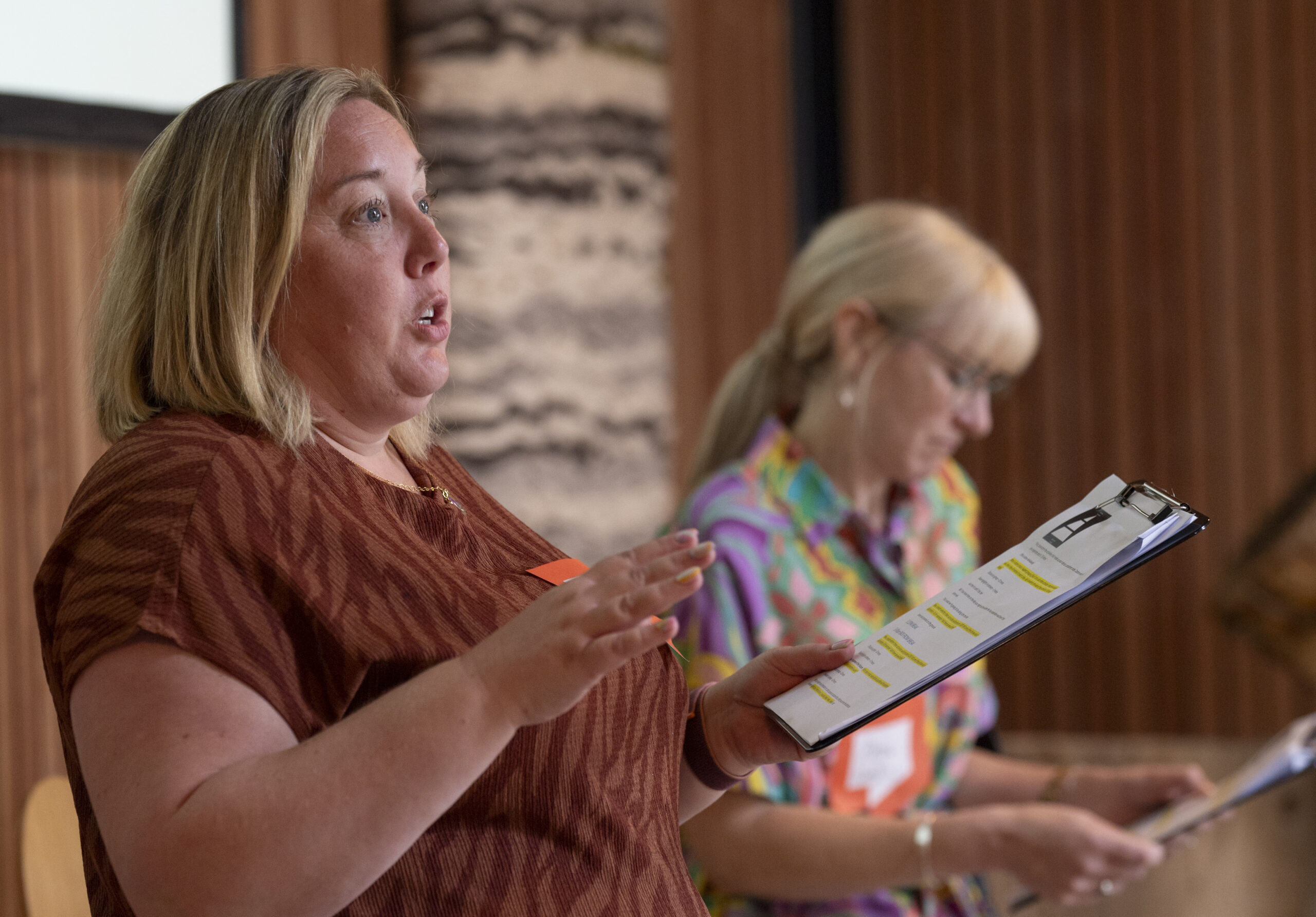
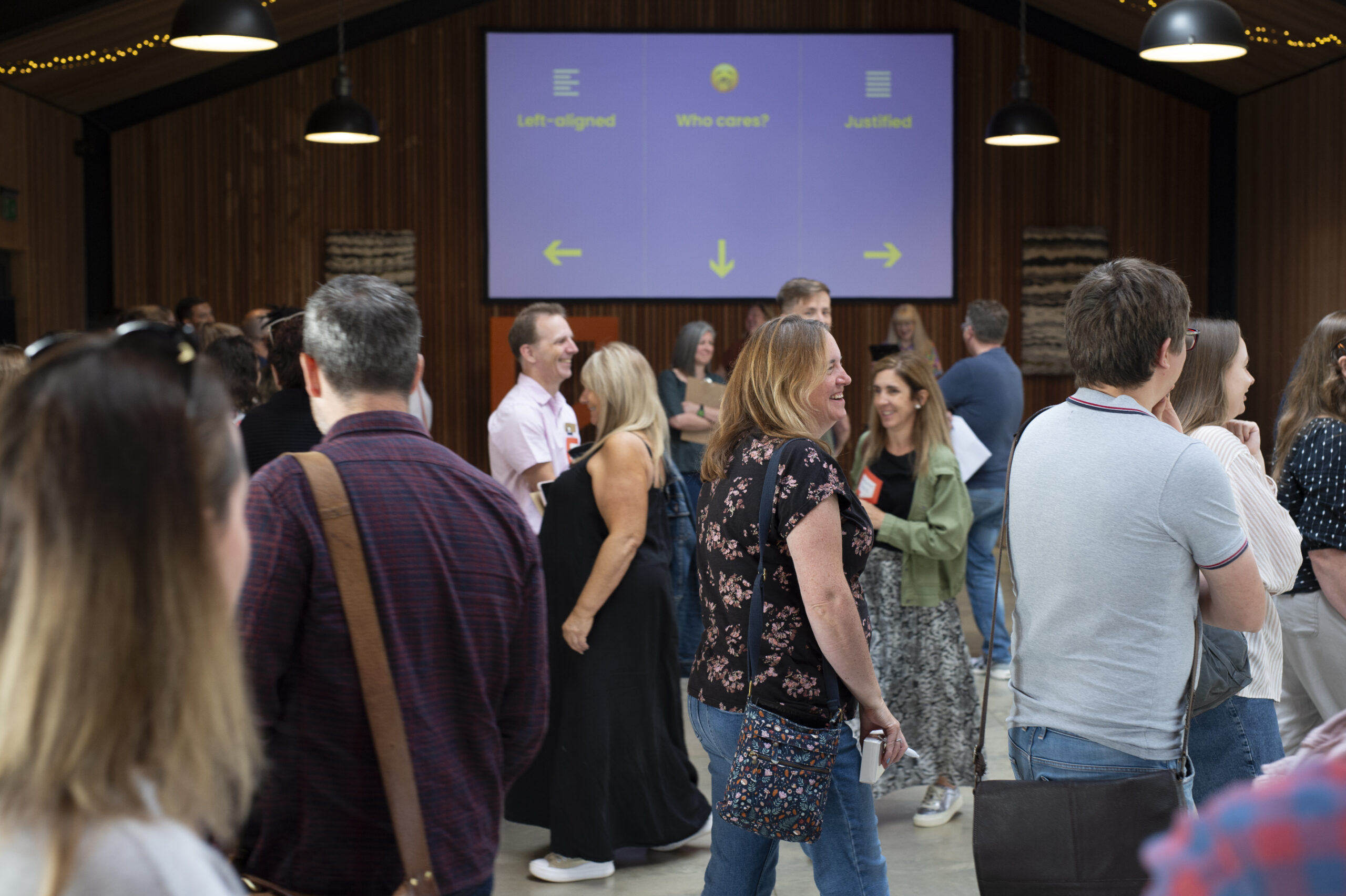
The Afternoon: Paraplanning tomorrow
After lunch, we got right back to the roots of the Paraplanners’ Assembly.
Back in 2013, our first gathering proved that when paraplanners get together to learn, fix and share, we’re able to tackle the biggest issues.
A decade ago, we wanted the financial planning world to recognise paraplanning as a choice of professional career. (And just look at us now!)
Today, the big questions seem to revolve around the future of paraplanning itself and our role in it.
What does artificial intelligence and automation mean for paraplanning and for us? Are remote working and hybrid teams really here to stay? What skills and knowledge are paraplanners going to need for a fulfilling career from now on?
Learn, fix and share
When we began to think about how to tackle these questions, it crossed our minds to invite a keynote speaker to put the world to rights for us.
But we soon realized that that speaker didn’t exist.
Because the future of work was not just about technology. It wasn’t just about personal development and technical knowledge. It wasn’t just about teams and leadership. It wasn’t just about the future of business.
It was too big a job for one person. But a bunch of people? Perhaps even an assembly?
And so we decided that the best people to consider the future of paraplanning were…paraplanners!
Let’s get started
Assembly hosts, Sam Tonks and Sarah Lees, kicked off the afternoon’s session.
We worked with foresight and innovation expert, Eleanor Winton, to help us design three very interactive sessions.
Eleanor recorded two video contributions that we showed to spark your thinking.
But the future of paraplanning? That conversation was up to us.
We knew from the surveys you completed that this kind of thing had been on your minds for a while. And we thought the Assembly was the perfect space for paraplanners to explore it. But you only got out what you were willing to put in, so you were ready to share your thoughts!
We were sure you were going to really enjoy it. We were sure you were going to feel good about having the chance to talk about the future. And we were certain it would be the start of a conversation that – thanks to your participation – our Assembly was uniquely placed to encourage among colleagues across the world of financial planning.
(And, besides, we arranged ice-cream in the break to fuel conversations!)
If you were there, we hope you enjoyed it. If you weren’t, there’s always next year!



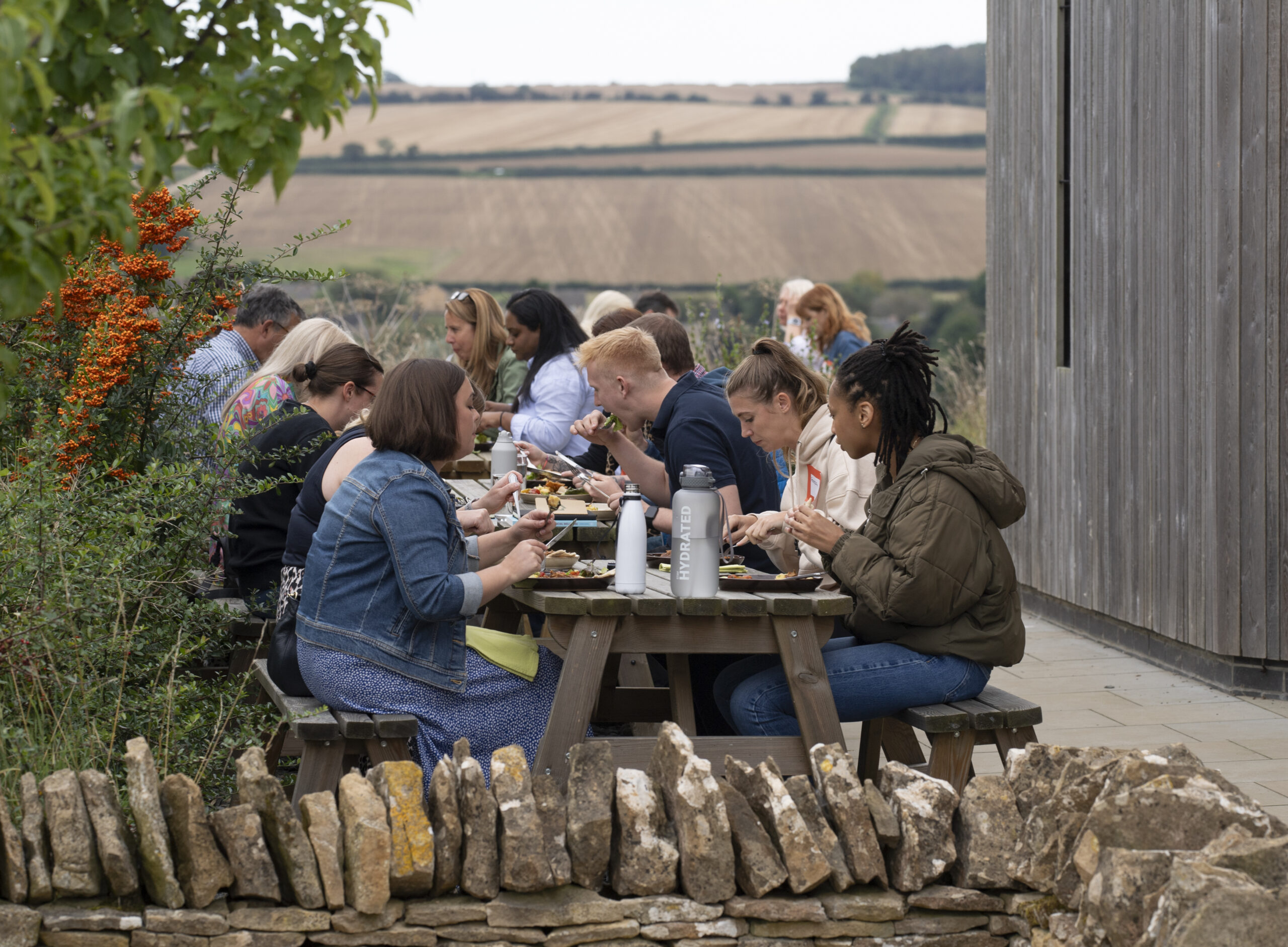
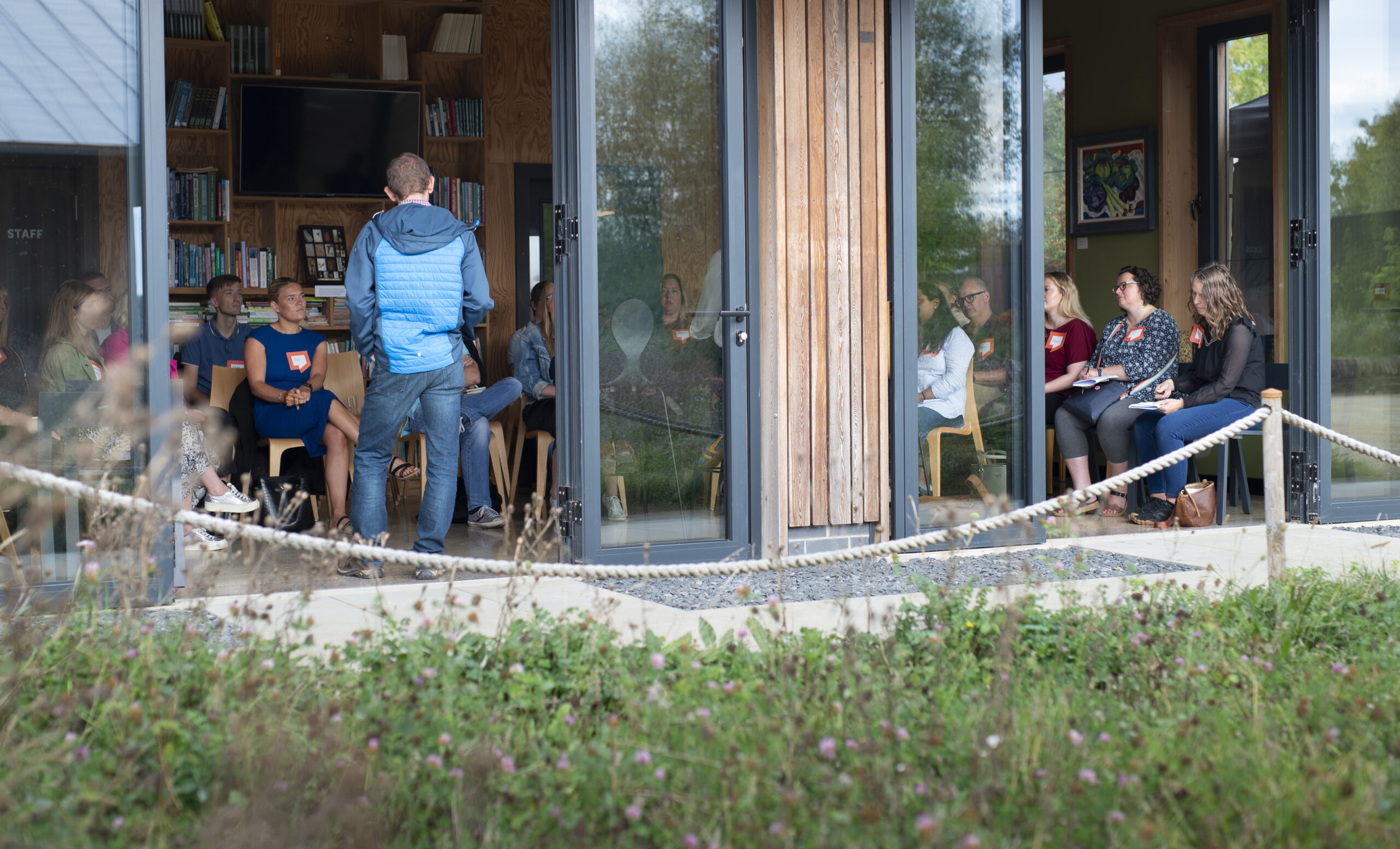

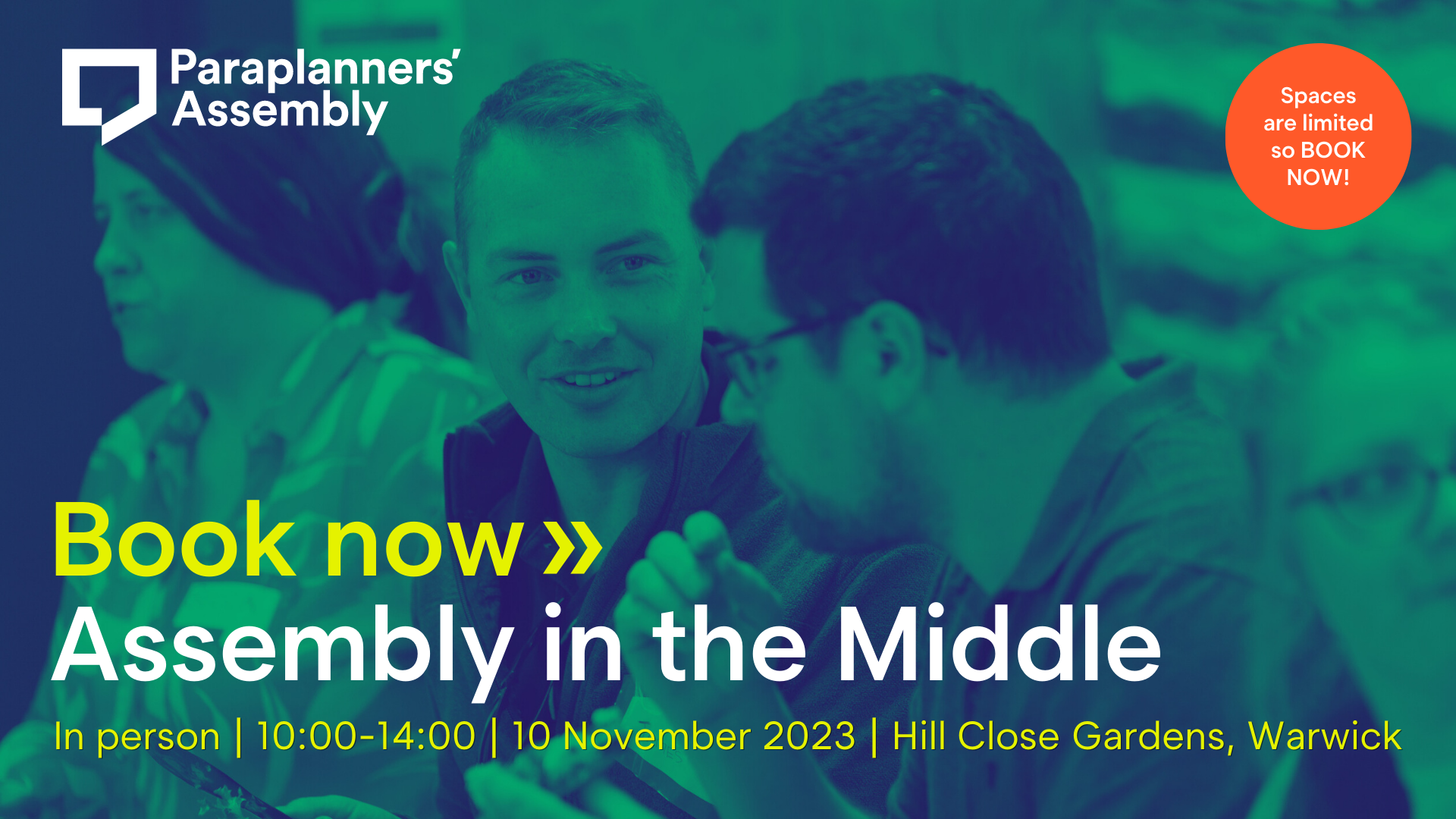
More than four years since it last gathered in person, Assembly in the Middle is back!
So if you’re a paraplanner who lives or works in the midlands of England, why not join organisers Caroline Stuart and Sam Tonks for an informal gathering at Hill Close Gardens in Warwick on 10 November 2023?
Assembly in the Middle will begin at 10am and finish at 2pm. But what happens in between is entirely up to you because, once you’ve booked your spot, we’ll invite you to submit ideas about what you’d like to learn, fix or share with other paraplanners on the day.
Why should I take part?
Because it’s part of the Paraplanners’ Assembly movement, Assembly in the Middle offers a supportive and encouraging space in which you can listen and learn, and share ideas, knowledge and insights.
And whether you’re in-house or outsourced, it’s a great way to meet other paraplanners from your neck of the woods – especially welcome when so many of us work from home these days.
It’s somewhere you can really focus and flourish – both professionally and personally.
Don’t forget to bring your lunch.
We’ll have coffee and tea and biscuits available throughout the day (plus chocolates, of course) but make sure you bring your own lunch or you’ll go hungry at lunchtime.
And finally…
You’ll feel you belong at an Assembly in the Middle because the Assembly in the Middle belongs to you.
Want to take part? Then tap ‘Book now’.

